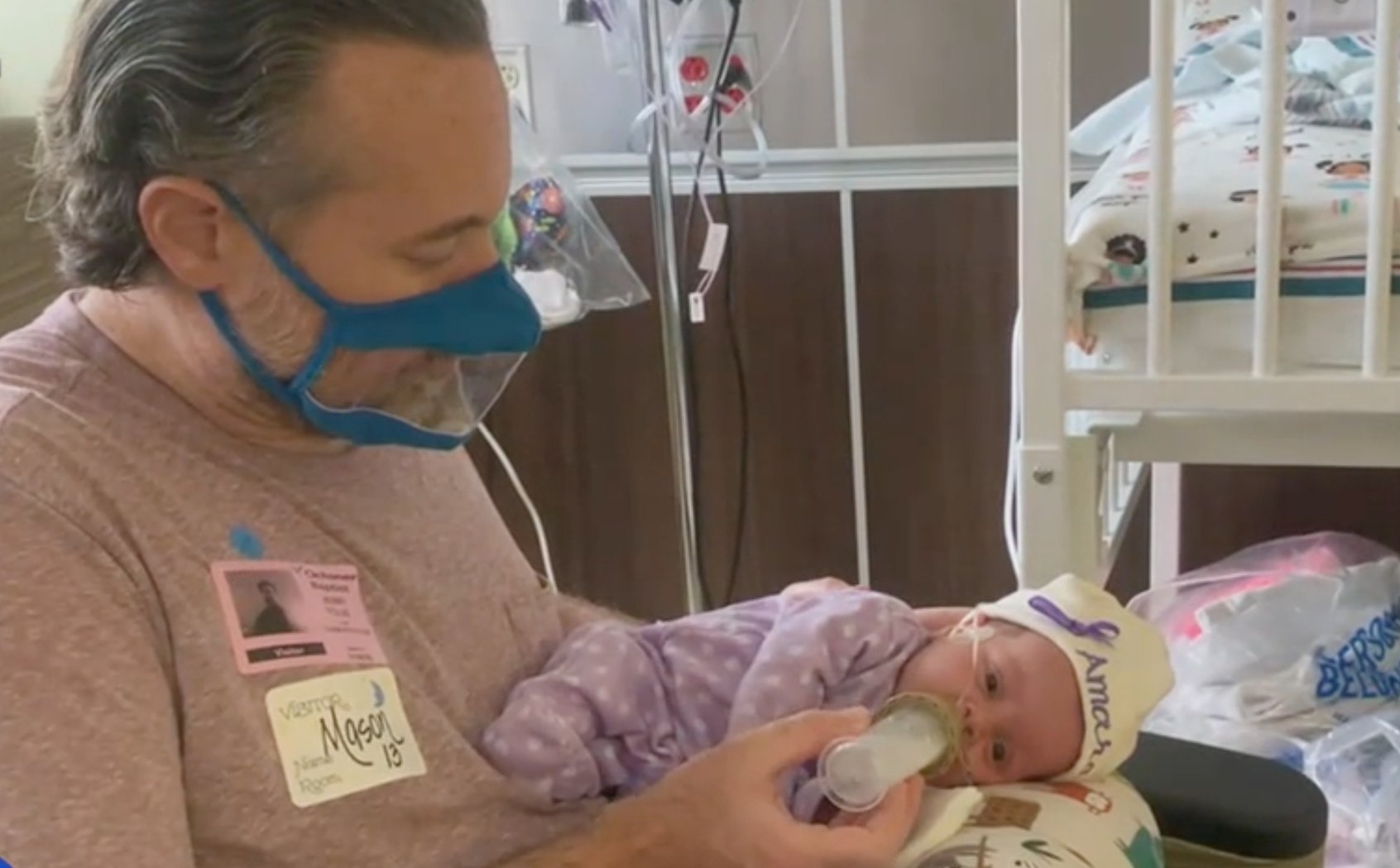
The current health crisis has changed hospital protocol in countless ways, both big and small. For parents with babies in the NICU, the weight of these changes are felt daily, as they carefully scrub in and don face masks before greeting their little ones. The importance of these precautions is undeniable, but they still present one nagging little problem: How can babies truly bond with their parents if they can't fully see their faces? Now, thanks to an innovative new face mask design, they finally can.
The face masks feature transparent front panels, which allow babies to see their parents' smiles for the very first time.
They're the brainchild of innovationOchsner, which first introduced them at Ochsner Baptist Medical Center in New Orleans. Interestingly enough, they weren't actually created with babies in mind — the team began working on them as a solution for hospital staffers who work with deaf patients. But it soon became clear that they'd come in handy for others, too.
So, the team started introducing them within the neonatal intensive care unit at Ochsner — and it wasn't long before they took off.
New mom Aria Mason-Folse has already been putting the face masks to good use.
"Having the ability to connect with [my daughter] this way has been its little ray of sunshine through all of this," Mason-Folse told Good Morning America this week.
She gave birth at Ochsner Baptist back in March, at the onset of the crisis. And as if the threat of this deadly virus wasn't enough to make the new mom worry, pregnancy complications forced her to gave birth well before her due date. Her baby, later named Amara, weighed only 1 lb. and was immediately rushed to the NICU.
For the last few months, Mason-Folse and her husband, Henri Folse, have been diligently visiting her in the NICU and doing everything they can to bond with her as she grows.
Still, the experience has been far from normal. The parents can only visit one at a time — never together — and must scrub in like doctors about to perform surgery. Though they try to smile and coo and make silly faces at their little girl, the surgical masks they used to wear blocked most of their facial expressions.
Luckily, this isn't a worry anymore.
The couple agreed to try out the masks as part of a pilot program in the hospital, and right away, they noticed a difference.
"You can see her watching our mouths, especially when I was singing to her," Mason-Folse said of Amara. "She likes the silly faces we make too. I feel excited by that, that she is responding so well to it. It's really reassuring that we made the right decision."
Aimee Quirk, CEO of innovationOchsner, isn't surprised the masks are helping preemies — as well as their parents.
"It allows for connection at a time when it's hard to do," Quirk told Good Morning America. "Seeing a person smile, it makes a big difference to somebody's day and the feedback we've received has been overwhelmingly positive."
Thanks to the masks' initial success, the team is busily working to produce more.
According to Quirk, her team partnered with local entrepreneurs to create the masks and have ramped up production with "a lot more coming."
For now, the masks are being distributed locally, but we wouldn't be surprised to see them popping up in more hospitals across the country soon. And not just in NICU wards, either.
According to Quirk, they have the potential to help people with special needs, those with dementia, and even teachers in early childhood education who may find that face masks hinder their ability to communicate with small children.
We've known for months that wearing a face mask in public can greatly reduce the spread of this deadly virus.
A study conducted in by Texas A&M in June found that wearing a mask "dramatically" decreases the likelihood of contracting the virus, noting that "airborne transmission via respiratory aerosols represents the dominant route for the spread."
"By analyzing the [virus] trends without face-covering using the statistical method and by projecting the trend, we calculated that over 66,000 infections were prevented by using a face mask in little over a month in New York City," wrote study author Renyi Zhang. "We conclude that wearing a face mask in public corresponds to the most effective means to prevent inter-human transmission."
After becoming the epicenter of the virus back in April, New York City — as well as New York State at large — implemented a mandatory face mask requirement for anyone who is out in public and cannot maintain a distance of 6 feet from others. Experts have said that this move directly correlated to the state's drop in coronavirus rates, which currently hover just over 1%.
Meanwhile, other states that have not issued mandatory face mask laws, such as Florida and Texas, have seen a dramatic rise in cases over the last two months. In fact, as of July, Florida has been named the new epicenter of the virus — not just in the US, but in the world.
It's become pretty clear that face masks save lives, and -- until we finally beat this virus -- are here to stay.
That's also why the innovationOchsner masks are getting such a round of applause for their clever practicality.
Mason-Folse, for one, would love to see them go far. She's seen their benefit in action, and she knows other NICU parents will feel the same.
"The time with each other bonding as parents and with her — you can only describe that as a blessing," she said of how the face masks have improved the moments she shares with her daughter.




